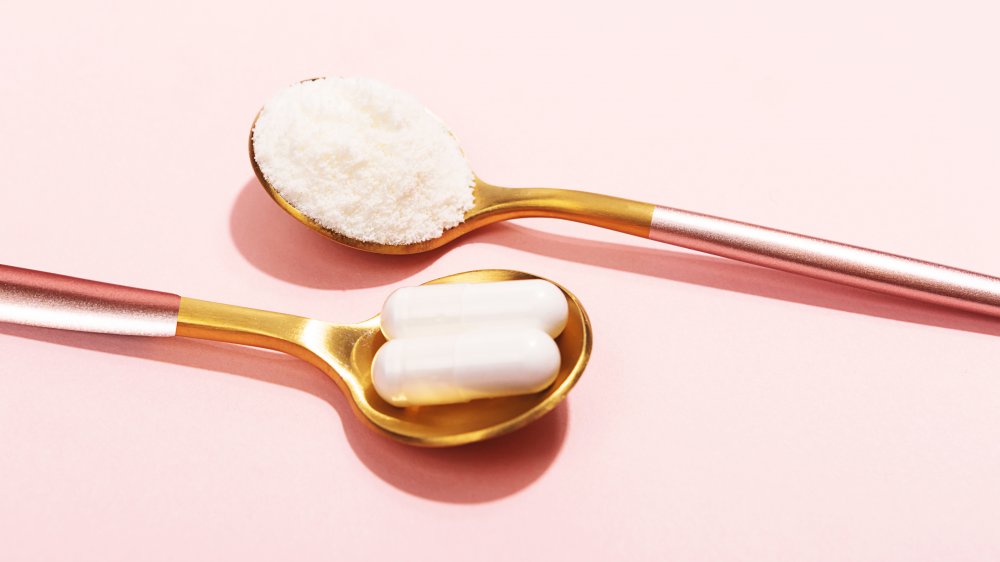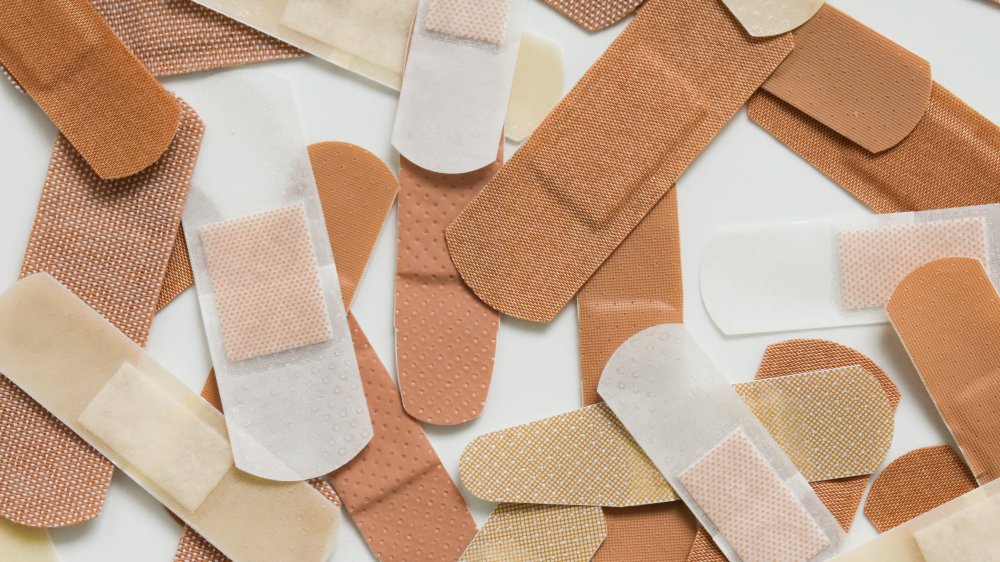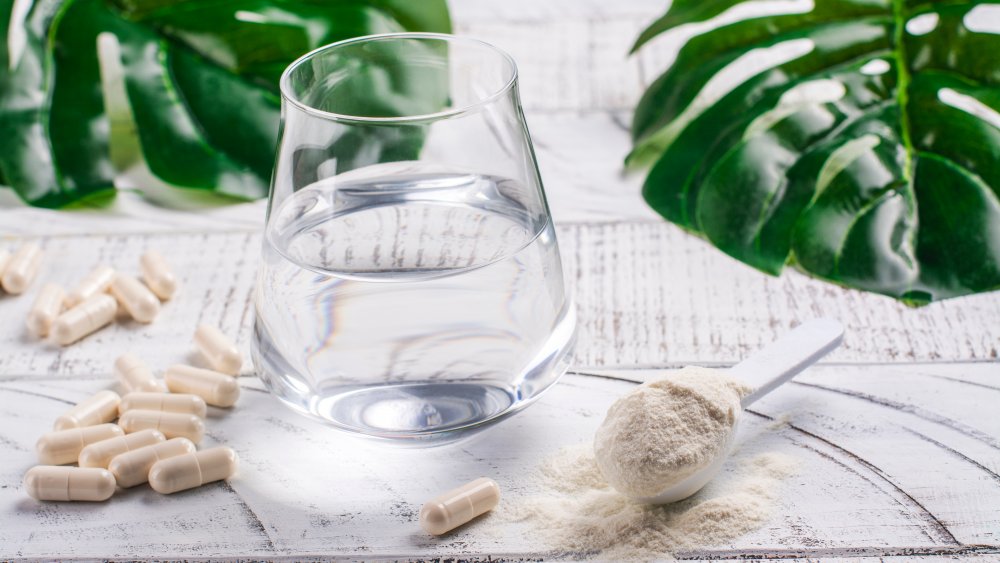When You Start Taking Collagen, This Is What Happens To Your Body
We may receive a commission on purchases made from links.
Collagen makes up about a third of all protein in the human body, making it the most abundant protein in your body. It's the main structural component of your skin, cartilage, and other connective tissues, and is also found in your hair, nails, bone marrow, and elsewhere.
Collagen isn't a single protein, but actually a family of proteins. There are around 40 different types of collagen that each have slightly different composition and function, but four types are most common. Type I collagen is found in most connective tissues including bone, ligaments, tendons, and skin. Type II collagen is found mainly in cartilage. Type III collagen forms thin fibers within certain organs. Type IV collagens form thin sheets of collagen that surround most tissues in your body (via Yale University).
As you may already know, collagen supplements are increasingly popular. In fact, the collagen market is expected to grow nearly 6 percent annually and could be worth $75 billion by 2027, according to market research company Grand View Research. The question is: What do collagen supplements actually do? Before you spend money on collagen pills, powders, shakes, or creamers, read up on the scientific evidence and expert opinions below.
Taking collagen might help your body produce more collagen
Your body produces collagen on its own. As Yale University explained, collagen proteins are the "main structural component of connective tissues." As such, your body doesn't necessarily need collagen supplements or collagen-rich foods to do its job. Nevertheless, collagen supplements might help boost natural collagen production in your body.
Beginning in our 20s, our bodies lose about one percent of their collagen each year, dermatologist Whitney Bowe told The New York Times. Because of this, "the concept of supplementing our collagen, especially as we age and as our body's natural collagen production declines, is incredibly appealing from a dermatologic standpoint," she said.
Here's the thing, though: Supplements contain collagen peptides, which are made of the same amino acids as the collagen found in your body and are more easily absorbed into your bloodstream, according to the publication. However, experts still aren't sure what percentage of these collagen peptides actually get turned into collagen after they're absorbed in the body, if any. So collagen peptides might boost collagen production in your body, but it might not.
Some dermatologists recommend collagen supplements for better skin elasticity
Although the popularity of collagen supplements is relatively new, some cultures have used collagen to boost skin health for centuries. According to WebMD, women in China have been consuming naturally collagen-rich foods like pig's feet and shark fins for centuries, with the belief that these foods help smooth wrinkled skin. And according to dermatologist Whitney Bowe, there is reason to believe that collagen supplements can benefit your skin.
"Just in the last few years, there have been some impressive studies showing that ingestible collagen can indeed impact the appearance of skin," Bowe told WebMD. She explained that the skin is made up of about 75 percent collagen, and that collagen is what helps your skin to look healthy. When skin collagen starts to decline — at a rate of about one percent per year starting in our 20s — our skin starts to appear wrinkled.
Overall, though, dermatologists say that more research needs to be done on collagen supplements and their impact on skin health. However, most agree that collagen supplements show promise and could make skin look healthier (via WebMD).
Collagen supplements may help hydrate your skin
As we age, our skin begins to produce less collagen. As a result, the skin becomes less and less elastic, and wrinkles start to appear (via Scientific American). There's no way to completely stop or reverse this, but there's some evidence to suggest that taking collagen supplements can increase skin hydration and collagen density, making it look more plump and less wrinkled.
A small randomized controlled trial published in the Journal of Cosmetic Dermatology in 2015 found that after just eight weeks of taking collagen supplements, participants' skin moisture levels were significantly higher than levels in the control group. The collagen supplements also improved the collagen density of skin, which makes skin look smoother.
Although the study's results are promising, it's important to keep in mind that the study was small; only 139 women in two separate trials were assigned either a collagen supplement or a placebo, and the trial lasted just 12 weeks. So while taking collagen supplements might keep your skin hydrated and youthful-looking, it's impossible to say for sure whether that will happen.
Some research suggests collagen can help with joint health
Researchers aren't just interested in the skin-deep benefits of collagen supplements. Because collagen is one of the main building blocks of our joints, there's reason to believe that collagen supplementation could boost joint health.
As part of a 2015 literature review published in Nutricion Hospitalaria, the authors combed through dozens of existing studies that looked at how hydrolysate collagen, the collagen peptides found in collagen supplements, affects joint health and function. The authors found that several preliminary studies show that collagen supplements can stimulate the regrowth of collagen tissue in joints by increasing collagen production as well as the production of other joint components. They also found that clinical trials show an association between collagen supplementation and a reduction of joint pain.
Although the research is in early stages and experts can't say for sure whether or not collagen supplements boost joint health, it's possible that they do. And since the researchers noted little risk with these supplements, it might be worth giving them a try.
Taking collagen could help reduce knee pain
For many of us, knee pain seems like an inevitable part of aging. However, it can be the result of an injury or a chronic condition like arthritis, and can affect people of all ages and backgrounds (via Mayo Clinic).
While collagen supplements aren't a magic cure to all knee pain, some evidence suggests that type II collagen supplements could reduce knee pain. A 2016 randomized controlled trial published in Nutrition Journal found something interesting: Study subjects who took a daily dose of a type II collagen supplement experienced significantly less knee pain after six months than those who received a placebo supplement or a glucosamine hydrochloride plus chondroitin sulfate supplement (which has also been thought to reduce knee pain).
Now, don't get your hopes up too high. The study was small, with only 191 subjects divided into three groups. It was also short, lasting just six months. Still, if knee pain is a problem for you and you've yet to find anything that helps, you could try type II collagen supplements. Of course, it's always a good idea to consult your doctor before adding supplements to your diet.
Taking collagen could help prevent bone loss
There are many good things that come with aging, like wisdom and a stronger sense of self. However, there are also some downsides, like inevitable bone density loss that can lead to health complications. Osteoporosis, a condition in which bones become brittle and less dense and are more likely to break, affects 25 percent of women and 5 percent of men age 65 and over in America, according to the Centers for Disease Control and Prevention (CDC).
Lifestyle changes like eating a healthy diet with adequate vitamin D and calcium, performing weight-bearing exercises, avoiding smoking, and drinking alcohol in moderation or not at all can help prevent osteoporosis and bone loss, the CDC revealed. There's also some evidence to suggest that collagen supplementation could prevent bone loss.
One 2016 review published in Revista Brasileira de Geriatria e Gerontologia found that collagen supplementation had a "positive therapeutic effect on osteoporosis" and could potentially increase bone mineral density. The jury's still out on exactly how and why this might be the case, and there's no guarantee that collagen supplements will help protect against osteoporosis and bone loss. However, they could be a good addition to an overall healthy lifestyle.
Collagen could increase muscle mass in older adults
Collagen is a type protein, which your body uses to build and repair tissue, produce enzymes and hormones, and build connective tissues like bones, muscles, cartilage, and skin (via WebMD). Getting adequate protein is essential to muscle maintenance and muscle growth.
Some evidence suggests that collagen supplements may be effective in increasing muscle strength and mass, particularly in older adults. A 2015 randomized controlled trial published in the British Journal of Nutrition found that adults 65 and over who drank 15 grams of collagen peptides dissolved in liquid within one hour of strength training had increased muscle mass and strength after three months compared to adults from the same age group who did not drink the collagen peptides.
There are two things to keep in mind here, though. First, this was a small study with 60 participants, all of whom were 65 and over. More research needs to be done to back up the study's results, and to potentially extend the results to other age groups. Second, the participants strength trained regularly — so, you shouldn't expect muscle gains from taking collagen without exercising.
One small study suggests that taking collagen could boost heart health
The popularity of collagen supplements is relatively new, which means that the research on the potential health benefits of collagen supplementation is in its infancy. It's a growing area of interest to researchers, but there's still so much we don't know, and it's impossible to say for sure what the benefits of collagen supplementation are.
That doesn't mean that collagen supplementation doesn't have serious potential to boost health, though. In a 2017 clinical trial study published in the Journal of Atherosclerosis and Thrombosis, researchers found that subjects who took collagen supplements twice daily had a lower ratio of LDL (bad) cholesterol to HDL (good) cholesterol than those who didn't take the supplements after six months, as well as a lower risk of heart disease overall.
That's great news, of course, but just 32 adults participated in the study, and they were healthy volunteers who had no history of heart disease or diabetes. Without further study, it's impossible to say whether the results are applicable to the general population.
Taking collagen could make your nails stronger
There are plenty of supplements out there that promise to give you shiny hair and strong nails, but not all of them are backed by evidence. While it's a bit too soon to say whether or not collagen supplements will strengthen your hair and nails, there is certainly some promising preliminary research.
In a 2017 clinical trial published in the Journal of Cosmetic Dermatology, 25 participants took 2.5 grams of collagen peptides once a day for six months then went off the supplements for four weeks. At the end of the study, participants nails grew faster and broke less often.
While more studies are needed, the participants in this study didn't experience any negative side effects as a result of the collagen supplements. So if you want to give collagen supplements a try and doing so is within your budget, you can feel safe doing so.
One study suggests that collagen could help with wound healing
Do your cuts and scrapes take longer than normal to heal? If so, you should know collagen supplements could help. As part of the 2019 pilot study published in the Journal of Drugs and Dermatology, researchers found eight healthy volunteers and gave them each a small biopsy on each thigh — that is, they removed a small piece of their skin. The wound on one thigh was stitched while the wound on the other thigh was treated daily with topical collagen powder. The researchers found that after four weeks, the collagen-treated wounds healed at least as well as those that had been stitched up.
Adam Friedman, a medical doctor and one of the authors of the study, told EurekAlert! that further studies are warranted, as applying collagen powder to a small biopsy wound daily is easier and cheaper for patients than going to a physician for stitches and suture removal. However, no one should do this without first consulting their doctor, as the type of collagen and type of wound matters.
Taking collagen by mouth will do more for your body than using collagen cream
If you're hoping that collagen will do positive things for your body, your best bet is to take it by mouth. Typically, this means dissolving the powder into a liquid or taking it in pill or chewable form.
Rubbing collagen cream on your skin probably won't do anything to boost collagen production in your body. Dermatologist Whitney Bowe told The New York Times that because collagen is produced in the dermis, a layer of skin that is well below the surface, it's unlikely that the collagen peptides you apply to your skin will actually make it there.
In theory, collagen taken orally will be absorbed into the blood stream and then shuttled through the blood to the parts of the body that need them. Of course, researchers don't yet know if this process happens exactly as it should. However, experts agree that if you're going to try collagen in hopes that it will have a positive effect on your body, the best way to do so is to take it by mouth (via The New York Times).
Some forms of collagen supplements could cause allergic reactions in some people
Although collagen supplements haven't been associated with any significant negative side effects, it's important to make sure your collagen supplement doesn't contain anything you're allergic to.
Some brands of collagen supplements are made from fish, shellfish, or eggs — all of which are among the top five most common food allergens as designated by the Food and Drug Administration (FDA). However, there is a silver lining. Because these allergens are so common, the FDA requires that all supplements containing one or more of these allergens must state the allergen on its label. Outside of allergens, though, supplements aren't required to list their ingredients.
If you have an allergy, it's always essential to check food and supplement labels to make sure you're steering clear of the foods that you're allergic to. In the case of collagen, anyone with a fish, shellfish, or egg allergy should look for collagen made from land animals that does not contain egg.
If you add collagen to your hot coffee, it probably won't do much for your body
It's fairly common to stir collagen powder (or even collagen-based creamer) into a morning cup of coffee, but research shows that this definitely isn't the most effective way to supplement. While collagen powder absorbs more easily into warm liquid than cold liquid, hot temperatures may also break down the collagen and negate its potential benefits.
Rresearcher and microbiologist Brooke Russell told The Conversation, "Collagen falls apart at temperatures above body temperature, turning it into plain gelatin — yes, the stuff in Jell-O. At these higher temperatures — when added to hot coffee, for example — collagen's molecular structure melts, diminishing or even negating the desired health benefits."
Instead of melting collagen into coffee or drinking hot bone broth, Russell suggests taking a refrigerated liquid collagen supplement or mixing collagen powder into a cold beverage. She also recommends buying collagen that has been tested by a credible third-party lab like the U.S. Pharmacopeia (USP). The Food and Drug Administration (FDA) doesn't regulate supplements so without a third-party certification, there's really no way to know whether a supplement actually contains what's on the label.
Collagen is unlikely to harm your body
Early-stage research has shown that collagen supplements have a host of potential benefits: healthier looking skin, reduced joint and knee pain, improved bone health, stronger nails, and more. However, more research needs to be done before we can say for sure whether or not collagen supplementation actually makes any of these things happen in your body.
All that said, one thing that is well established and consistent across the research is that collagen supplements seem to be safe. "[Collagen] has been around for ages, and there is a large body of evidence supporting its safe use," Andrea Wong, senior vice president for scientific and regulatory affairs at the Council for Responsible Nutrition, told WebMD. She explained that all studies looking into collagen's potential benefits also look for side effects, and that no significant negative side effects had ben documented. If you want to try collagen for one or many of its potential benefits, go ahead. It might not boost your health significantly, but it also won't hurt.














